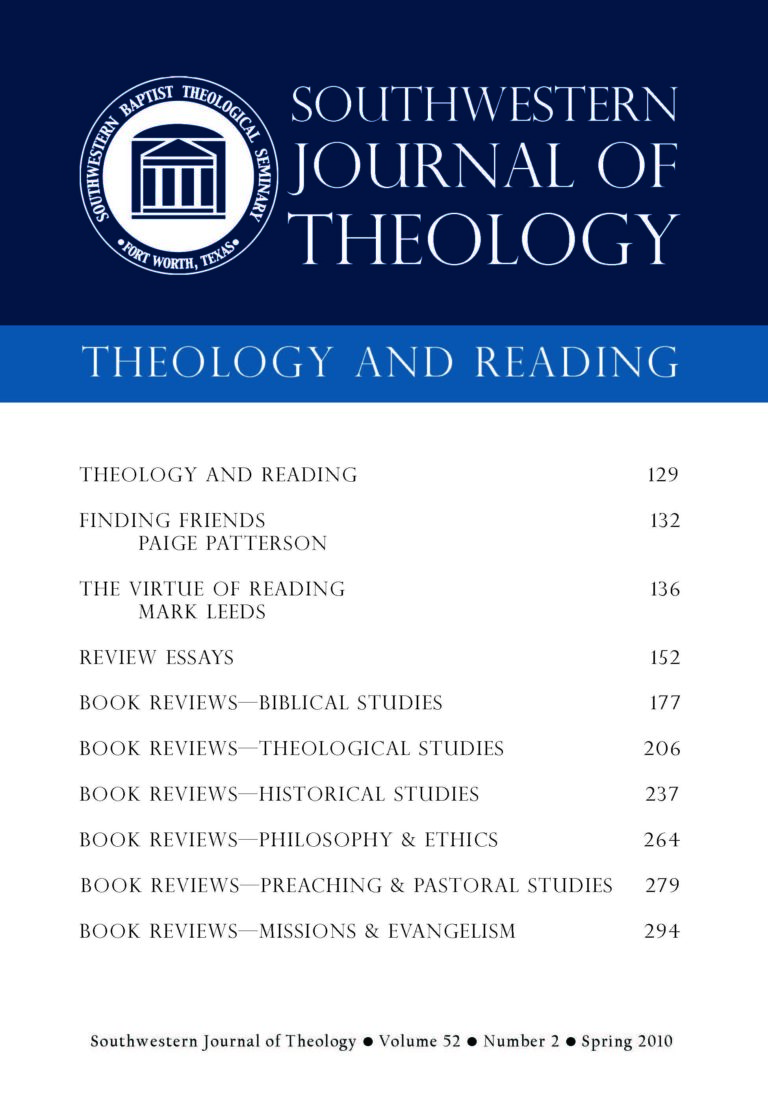
Theology and Reading
Southwestern Journal of Theology
Volume 52, No. 2 – Spring 2010
Managing Editor: Malcolm B. Yarnell III
By James W. Bryant and Mac Brunson. Nashville: B&H, 2007. 320 pages. Softcover, $24.99.
In 1980, W.A. Criswell, then long-time pastor of the First Baptist Church of Dallas, produced Criswell’s Guidebook for Pastors. Broadman Press published and sold this resource for pastors and ministry students for twenty-eight years. While Bryant and Brunson chose not to revise and update Criswell’s enduring work, such a revision was the original intent of the authors. In fact, it was the tenure of Criswell’s Guidebook that prompted the authors to start afresh. “So many things have changed in the world since [1980]. The era in which the contemporary pastor serves is now clearly identified as the postmodern era. It is time for The New Guidebook for Pastors” (4–5).
Since The New Guidebook is a different work, we will not seek to make this review a deep comparison of the two books. However, placing the books’ structures side by side is interesting. Both books have twenty-one chapters. Bryant and Brunson move some things to appendices that Criswell places in the body, such as service orders and ceremonies. In each book, the pastor’s call, preaching, and preparation take primacy in the order of chapters, and both books finish with the reward of a pastor. Between, much similarity exists in structure though Bryant and Brunson deal more with such recent issues as the Internet and other technologies. Interestingly, while The New Guidebook includes a chapter devoted to “leadership,” leadership is not included in the chapters or division headings for Criswell. This well reflects the rise of “leadership” as a major topic for conferences and books since Criswell’s 1980 publication.
Mac Brunson is a former pastor of the First Baptist Church of Dallas and the current pastor of the First Baptist Church of Jacksonville, Florida. Prior to his time in Texas, he served in North Carolina as pastor and was involved in the leadership of the Baptist State Convention of North Carolina. James W. Bryant is Senior Professor of Pastoral Theology of Criswell College. He has served as pastor or on the pastoral staff of churches in Georgia, Texas, New Mexico, and Arkansas. To find two more qualified authors for this work would be difficult indeed.
Every chapter in The New Guidebook begins with “The Pastor . . . ” Bryant and Brunson develop their advice along twenty-one different divisions of the work and life of the pastor, including the following matters: the pastor’s call, preparation, preaching, prayer life, family, first church, leadership, staff, worship, technology, missions and evangelism, ordinances, weddings and funerals, counseling, finances, ethics, politics and moral issues, changing churches, denomination, retirement, and reward.
The fourteen appendices, include, among other things, the Baptist Faith and Message 2000, how to build a personal library, and where a pastor can go for help when he is fired. An encouraging feature of the book is that every chapter includes a brief opening statement written by pastors and other men of God, speaking heart to heart to the reader on the significance of that chapter to his ministry.
So much of the book is helpful, it is difficult to choose what to include in this review. The New Guidebook includes the usual chapters on subjects like preaching and weddings and funerals, but the chapter on the pastor’s prayer life is a welldone and welcome addition that is often overlooked in such works. The authors point pastors in the right direction concerning both his personal and professional handling of finances and ethics, two of the most dangerous matters that pastors face. Two other chapters not always found in books of this genre guide the pastor through changing churches and help him with politics and moral issues.
Some criticism of such an enormous undertaking is inevitable, if for no other reason than the brevity of the work in comparison to its scope. For instance, while the authors give advice on weddings and devote some space to divorce and remarriage, no developed theology of marriage emerges. As Jesus demonstrated in Matthew 19:3–6, any answer to the questions related to divorce must begin with a discussion of marriage, beginning “in the beginning.” Given this lack, the authors follow the well-worn pattern of looking at divorce and remarriage through the prism of seeking what the Bible allows regarding divorce rather than building an understanding of divorce on the basis of a sound exegesis of marriage.
Of concern also is the authors’ somewhat confusing message on counseling. In the chapter on worship, the authors write, “You will also be surprised how much counseling you can accomplish through an expositional sermon” (101). How true! The heart of counseling is preaching in person. Counseling is opening the Bible personally to the real needs of the individual sheep. Yet the authors opine, “The pastor may be a minister by occupation, but he is likely a layman when it comes to counseling” (158). This professionalization and compartmentalization of ministry stands contrary to Baptists who historically have eschewed the division of clergy and lay and have held to the sufficiency of the Scriptures for “teaching, reproof, correction, and training in righteousness.” Since the authors assert that the exposition of the Word from the pulpit is sufficient for counseling, one must wonder why the same Word is not sufficient when well exposed to people individually.
With the caveats above, much is to be commended in this work. Pastors will find it very helpful, and we can recommend it heartily.





